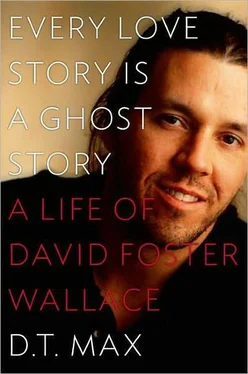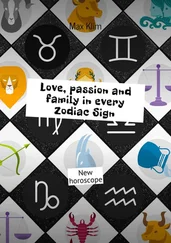Wallace was thrilled that his personal life was finally in order: he took it as evidence that he had matured, left behind his unfocused, hedonistic, self-indulgent past. 9The couple watched DVDs together— The Wire was a favorite; he thought of writing an essay on how the best writing in America was for television shows. Wallace felt strong in his sobriety as he never had before, the pair even keeping wine for guests. Wallace liked to remind Green what a good companion he was. “I took out the garbage. Did you see that?” he would say to her, or “I put tea on for you when you were driving home!” Some of his bachelor ways lingered, though. When he wrote he would go from the garage to the guest room, where there was an extra computer, and on to the family room, to write in longhand with his earplugs in—“scattering debris, intellectual and otherwise,” as Green remembers. She was appalled to find his towels and socks hanging from her paintings. Soon they were in couples therapy, working on these issues. He agreed to a clothesline outside.
Wallace often got mail from aspiring authors, many modeling their prose after his, and one day Weston Cutter, a young writer, wrote to ask Wallace, why bother writing? “It’s just this: how do you keep hope?” Cutter asked. “How do you not just get tired of all this shit, all the time from every vector, public and private and governmental? And more pressing, how do you not wear yourself out and feel as if you’re just another supplier of said stuff?” “This is like listening to a transcript of my own mind,” Wallace jotted at the bottom of his letter in response, adding, “Basically — I empathize. I have no answers. I do know I’m easiest when I accept how small I am and how paltry my contribution is as a % of total. But >60 % of the time I don’t/can’t accept it. Go figure.”
Shortly after his arrival in Claremont Wallace had told the Los Angeles Times reporter, “I’m poised, ready to write, 10 hours a day.” But of course being ready to write was not the same as writing. There was always the teaching and the counseling and the sponsoring. He wanted to help those most in need, offering informal advice and complete availability, paying it forward. 10He wrote in his introduction to English 67—Literary Interpretation:
Clinically shy students, or those whose best, most pressing questions and comments occur to them only in private, should do their discussing with me solo, outside class. If my scheduled office hours don’t work for you, please call me so that we can make an appointment for a different meeting time.
One student, Kelly Natoli, remembers Wallace introducing himself on the first day of a creative writing class: “He said, ‘It’s going to take me, like, two weeks to learn everyone’s name, but by the time I learn your name I’m going to remember your name for the rest of my life. You’re going to forget who I am before I forget who you are.’”
In 2005, Kenyon College invited Wallace to give an address at its graduation. The student invitation committee did not know much about Wallace, which may have been just as well, since the real Wallace differed at this point almost 180 degrees from the Wallace of popular imagination; a slacker exterior hid an intense moralist, someone whose long experience in recovery had made him into an apostle of careful living and hard work. Success had to be earned; do your homework; make your bed. How many times had he told his students that the worst thing to happen to them would be to be published before they were forty? At Kenyon, Wallace saw a chance to set out the things he cared about without the frustrating contrivance of the novel. He could just tell the audience to be mindful instead of trying to orchestrate it through his characters. He had a chance to remind that most self-centered of cohorts, college students, to get over themselves — or, better, outside themselves. His point of departure for his speech was similar to the one he’d set out in a letter to a friend in 1999: “You’re special — it’s O.K. — but so’s the guy across the table who’s raising two kids sober and rebuilding a ’73 Mustang. It’s a magical thing with 4,000,000,000 forms. It kind of takes your breath away.”
So for the Kenyon College address, he wrote a speech against egoism and egotism, about openness and humility, of apostles who behold but cannot see. He inserted a favorite joke from recovery. Two young fish are swimming along and they happen to meet an older fish swimming the other way. The older fish goes by and calls out to them, “Morning, boys, how’s the water?” The younger fish continue side by side for a while and then one stops and says, “What the hell is water?” In other words, it was not hard to be successful in conventional terms; what was hard was to be aware of life as you lived it. “The trick,” he underscored, “is keeping the truth up front in daily consciousness.” He continued:
Learning how to think really means learning how to exercise some control over how and what you think. It means being aware enough to choose what you pay attention to and to choose how you construct meaning from experience. Because if you cannot or will not exercise this kind of choice in adult life, you will be totally hosed. Think of the old cliché about the mind being “an excellent servant but a terrible master.”
He explained to the students that they could stand in a supermarket line and experience nothing but the anxiety and irritation their college-augmented sense of superiority would entitle them to or they could, in the midst of that same experience, open themselves up to a moment of the most supernal beauty—“on fire with the same force that lit the stars — compassion, love, the subsurface unity of all things.” It was up to them, of course; they could do as they chose: “But if you’ve really learned how to think, how to pay attention, then you will have other options.”
The truth behind banalities always excited and embarrassed Wallace, filling him with the wonder that, as he wrote in Infinite Jest , “clichéd directives are a lot more deep and hard to actually do .” Over the past twenty-five years his mental life had run a huge circuit through the most astonishing complexities to arrive at what many six-year-olds and nearly all churchgoers already understood. He wasn’t sure whether what he had written was deep or unimportant. As he worked on the speech, he and Green joked that she should do a little soft-shoe behind him while he read it from the podium. Wallace delivered his words in his academic robe, bent slightly forward, a lock of hair covering his face, sweat dripping down his neck, in his intense, slightly quavering voice, speaking modestly and hesitantly. It was as if there was nothing more uncomfortable for him than being there, at this podium, but what he had to say was too important to keep it to himself. There was a sense that day that the man speaking these ordinary phrases had earned that right. It was one thing if your aunt told you you weren’t the center of the universe just because you thought you were; it was another if the author of Infinite Jest did. Wallace was someone whom younger people felt a link to, someone who had defied the corruptions of the adult world. 11
All this time the reputation of Infinite Jest was growing. The novel was connecting with more and more readers, passed along and recommended by word of mouth and on the Internet. This was true even though the world had changed drastically in the decade since Wallace had written it. The current danger was not from total immersion but from relentless fragmentation, not from watching one video to death but from skipping among hundreds. Americans were now not passively but frenetically entertained, and the warning shot turned out to be not Wallace as a child, glued to the four stations of 1960s Urbana, but Wallace in Bloomington, clicking among seventy-five channels of satellite TV, unable to decide which show to watch lest he miss a better one. Instinctively, Wallace was wary of the emerging technology. “I allow myself to Webulize only once a week now,” he wrote a graduate student who was helping him with his math book in July 2001, and he didn’t become a consistent emailer for several years afterward. “Thank God,” Karen Green remembers him saying when they got a new piece of computer equipment, “I wasn’t raised in this era.” 12
Читать дальше












